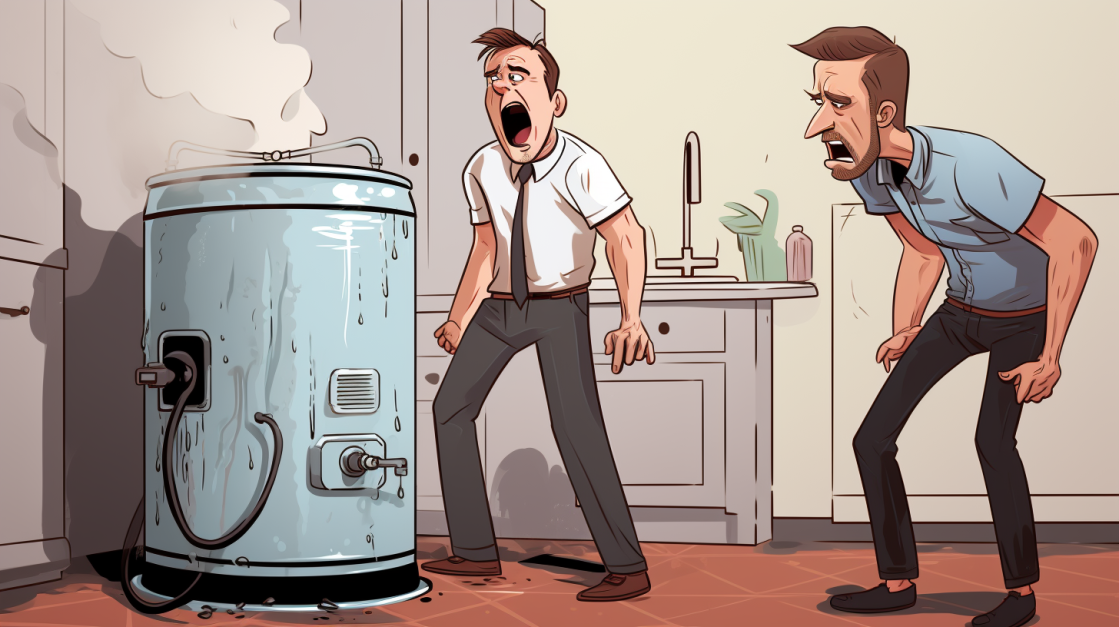Are you tired of dealing with common water heater issues?
Well, we've got some answers for you.
In this article, we'll explore why these frustrating problems keep occurring.
From the lack of hot water to fluctuating temperatures and strange noises, we'll cover it all.
And let's not forget about leaking water heaters and pilot lights that won't stay lit.
So, if you're ready to understand and fix these common water heater issues, let's dive in together.
Lack of Hot Water
One common issue with water heaters is a lack of hot water. This problem can be frustrating and inconvenient, especially during the cold winter months when a warm shower or bath is essential for comfort.
There are several possible causes for this issue. One reason could be a malfunctioning thermostat, which fails to regulate the temperature of the water effectively. Another possible cause is a faulty heating element, which may need to be replaced.
Additionally, sediment buildup in the tank can reduce the amount of available hot water. In some cases, the issue may be as simple as a tripped circuit breaker or a blown fuse.
Regular maintenance and prompt repairs can help prevent and resolve this problem, ensuring a consistent supply of hot water for your household.
Water Temperature Fluctuations
Water temperature fluctuations can be a frustrating and inconvenient issue with water heaters. It can be quite bothersome when you're in the middle of a relaxing shower and the water suddenly turns cold or scalding hot.
These fluctuations can occur due to various reasons. One common cause is a malfunctioning thermostat. If the thermostat isn't working properly, it may not accurately regulate the temperature of the water, leading to fluctuations.
Another possible cause is mineral buildup in the tank. Over time, minerals can accumulate and form a layer of sediment at the bottom of the tank, affecting the heating process and causing temperature variations.
Additionally, issues with the heating element or a faulty pressure relief valve can also contribute to temperature fluctuations.
To avoid these problems, regular maintenance and inspections of your water heater are important to ensure its optimal performance.
Strange Noises Coming From the Water Heater
We have encountered a number of strange noises coming from our water heater. It started with a rumbling sound, like the water boiling inside. At first, we thought it was normal, but then the noises became louder and more frequent. We heard popping and banging sounds, as if something was hitting the sides of the tank. It was concerning, and we knew something was wrong.
After some research, we discovered that these noises could be caused by sediment buildup in the tank. Over time, minerals and debris can settle at the bottom, creating a layer that disrupts the heating process. This causes the water to boil, resulting in the strange noises.
To fix the issue, we'd to drain and flush the tank to remove the sediment buildup. After doing so, the noises disappeared, and our water heater started working properly again.
Leaking Water Heater
To address the issue of a leaking water heater, it's crucial to identify the source of the leak and take immediate action. A leaking water heater can cause significant damage if left untreated, leading to expensive repairs or even the need for a complete replacement.
The most common sources of leaks in water heaters include faulty valves, loose connections, and corroded tanks. It's important to inspect these components regularly and address any issues promptly. If the leak is coming from a valve, tightening or replacing it may solve the problem.
However, if the tank itself is leaking, it's essential to shut off the water supply and contact a professional plumber for further assistance. Neglecting a leaking water heater can lead to further damage and potentially hazardous situations, so it's crucial to address the issue promptly.
Pilot Light Won't Stay Lit
One common issue that occurs with water heaters is the pilot light not staying lit. This can be a frustrating problem, as a pilot light that keeps going out means no hot water.
There are several possible reasons for this issue.
Firstly, it could be due to a faulty thermocouple. The thermocouple is a safety device that detects whether the pilot light is lit and sends a signal to keep the gas valve open. If the thermocouple is malfunctioning, it may not send the correct signal, causing the pilot light to go out.
Another possible cause is a dirty or clogged pilot light orifice. Over time, dust and debris can accumulate in the orifice, obstructing the flow of gas and causing the pilot light to extinguish.
In some cases, a draft or gust of air near the pilot light can also cause it to go out.
To troubleshoot this issue, it's recommended to follow the manufacturer's instructions, which typically involve cleaning the pilot light assembly and checking the thermocouple for proper functioning.
If the problem persists, it's best to contact a professional plumber or technician for further assistance.
Frequently Asked Questions
How Much Does It Cost to Repair a Water Heater That Is Not Providing Enough Hot Water?
When a water heater isn't providing enough hot water, the cost to repair it can vary depending on the specific issue. Factors such as the type of heater, extent of the problem, and the need for replacement parts can all contribute to the overall cost.
It's best to consult with a professional plumber who can assess the situation and provide an accurate estimate for the repair.
Are There Any DIY Solutions to Fix Water Temperature Fluctuations in a Water Heater?
There are a few DIY solutions to fix water temperature fluctuations in a water heater.
One option is to check the thermostat and adjust it if necessary.
Another option is to flush the water heater to remove any sediment buildup that may be causing the fluctuations.
Additionally, insulating the hot water pipes can help maintain a more consistent temperature.
It's important to remember that if these solutions don't work, it may be best to consult a professional to avoid any further issues.
What Could Be the Cause of Strange Noises Coming From the Water Heater, and Is It Dangerous?
Strange noises coming from a water heater can have various causes and may or may not be dangerous. It's important to investigate the source of the noise to determine if any action is needed.
Potential causes include:
- Sediment buildup
- A faulty heating element
- A malfunctioning pressure relief valve
Consulting a professional plumber is recommended to accurately diagnose the issue and ensure the safety of your water heater.
Is It Possible to Fix a Leaking Water Heater, or Do I Need to Replace It?
It is possible to fix a leaking water heater, but it depends on the severity of the leak and the condition of the heater.
Sometimes a simple repair, like replacing a valve or tightening a connection, can solve the issue.
However, if the leak is significant or the heater is old and worn out, it may be best to replace it altogether.
Consulting a professional plumber is recommended to determine the best course of action.
What Are the Potential Reasons for a Pilot Light Not Staying Lit, and Can I Fix It on My Own?
There are a few potential reasons why a pilot light may not stay lit, but we can definitely try to fix it ourselves.
- It could be due to a faulty thermocouple.
- Another possible reason is a dirty pilot orifice.
- A gas valve issue could also be the cause.
To address the issue, we can start by cleaning the pilot orifice and checking the thermocouple for any damage or misalignment. These steps might solve the problem.
However, if these steps don't work, it's best to call a professional for assistance.
Conclusion
Overall, common water heater issues can occur due to various reasons such as a lack of hot water, water temperature fluctuations, strange noises, leaking, and a pilot light that won't stay lit. These problems can be frustrating and inconvenient, but with proper maintenance and timely repairs, they can be resolved.
Regularly checking and addressing these issues can help ensure a consistent supply of hot water and a well-functioning water heater in the long run.



